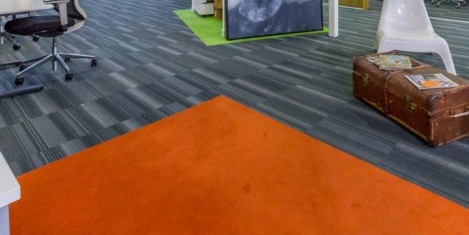April 13, 2017
Over three quarters of workers prefer traditional employment to the gig economy 0
 Much has been written about the inexorable rise of the gig economy. However, a new survey from jobsite Glassdoor, claims that only 13 per cent of workers across all employment types would even consider this route for future employment, and the vast majority of employees (76 percent) feel more secure sticking to permanent employment in 2017. As with any work arrangement, using temporary or “gig” workers has both benefits and drawbacks when set against traditional employment.
Much has been written about the inexorable rise of the gig economy. However, a new survey from jobsite Glassdoor, claims that only 13 per cent of workers across all employment types would even consider this route for future employment, and the vast majority of employees (76 percent) feel more secure sticking to permanent employment in 2017. As with any work arrangement, using temporary or “gig” workers has both benefits and drawbacks when set against traditional employment.
The survey suggests that the major perceived benefit is flexibility, both for job seekers and employers. When asked the question, “What do you think would be the biggest advantage of working in the gig economy?”, most (35 percent) of employees selected “flexible working”, followed by “better work-life balance” (11 per cent) and the ability to “be my own boss” (10 percent). Furthermore, 39 percent of female employees feel that the biggest advantage of working in the gig economy would be the flexible working, compared to just 31 percent of men. However, 73 percent of women also reported they already enjoy a good work-life balance in their current roles.
Salaries and benefits remain the most important workplace factors for both men (56 percent) and women (63 percent), something which is typically less stable in gig or contract work.
Gig employment for task-based jobs like car rides, accommodation rentals, and food deliveries are all now mainstream services. Glassdoor’s previous research for the US labour market suggests a slowdown for gig work in 2017, especially as job seekers weigh the pros and cons of this employment type. This new UK survey finds that only 12 per cent of those already self-employed feel they would earn more if they left a job to take on work which paid “per activity” (rather than an annual salary), with 21 per cent of those in full time work feeling the same. On a wider level, just one in ten of all respondents across all forms of employment believe that the gig economy would become the “future of work,” with double that amount (20 per cent) feeling it actually exploited workers and harmed employees’ rights.
In terms of job generation, only 13 per cent of all respondents predict that the gig economy would be a good way to reduce unemployment and create jobs in the future. When broken down by gender, nearly a third of women (31 per cent) feel that the gig economy would only ever be for a “limited number of workers” and was not accessible across a “wide range of roles”. This was opposed to just a quarter of men.
The millennial generation of employees has been labelled as the group who will structure and shape the way we work in coming years. However, only 10 per cent of 18-24 and 9 per cent of 25-34 year olds are of the opinion that the gig economy will eventually become the “future of work.”
Dr. Andrew Chamberlain, Glassdoor’s Chief Economist said: “The gig economy may be associated with prodigious growth of app-based taxi rides and food delivery, however, as we’ve already witnessed in the U.S., the impact on the UK workforce could remain minimal in the longer term.
“The main reason is size. Although many ride-sharing and travel platforms have popped up in recent years, they’re still confined to a small corner of the workforce. Further, gig roles only really work for relatively simple jobs that are easy to measure, don’t require deep institutional knowledge, and don’t rely on long-term relationships. The majority of the fastest growing jobs in the labour market today require human creativity, flexibility, judgment, and soft skills. For some jobs, the UK gig economy is here to stay. But don’t expect the majority of the workforce to be part-time contractors any time soon.”
Image: Jack Lemmon finally gets a corner office in The Apartment

















 Very few organisations are ready to manage a workforce where the latest technologies and people work side by side. Just 13 percent of UK companies are ready to respond to digital disruption and create “the organisation of the future”; despite 88 per cent believing this has become a priority. This is according to the 2017 Deloitte Global Human Capital Trends survey, which tracks the top trends shaping the agenda for HR and business leaders. However, while UK companies believe they are ill-prepared for the change brought by digital disruption, this has not stopped many of them from embracing disruptive technologies. 42 per cent report that they have adopted robotics, cognitive and artificial intelligence (AI) technologies within all or parts of their workforce. Another 42 per cent are running pilots in certain areas of their organisation. But only 16 per cent say they are ready to manage a workforce with people, robots and AI working side by side.
Very few organisations are ready to manage a workforce where the latest technologies and people work side by side. Just 13 percent of UK companies are ready to respond to digital disruption and create “the organisation of the future”; despite 88 per cent believing this has become a priority. This is according to the 2017 Deloitte Global Human Capital Trends survey, which tracks the top trends shaping the agenda for HR and business leaders. However, while UK companies believe they are ill-prepared for the change brought by digital disruption, this has not stopped many of them from embracing disruptive technologies. 42 per cent report that they have adopted robotics, cognitive and artificial intelligence (AI) technologies within all or parts of their workforce. Another 42 per cent are running pilots in certain areas of their organisation. But only 16 per cent say they are ready to manage a workforce with people, robots and AI working side by side.




 The more recent employment figures for London suggest that until the terms of Brexit are known and put in motion, the jobs market will remain cautious. This is according to the latest Morgan McKinley London Employment Monitor which found that despite an 81 percent increase in jobs available and an 83 percent increase in professionals seeking jobs; compared to a 115 percent increase in jobs this time last year, the 2017 spike was muted in comparison. The 83 percent increase in job seekers month-on-month is coupled with a 29 percent decrease, year-on-year. Contributing to the decrease is the trickling off of non-British EU nationals working in the City, who comprise up to 10 percent of its workforce. In a post-Brexit survey of professionals conducted by Morgan McKinley, these individuals reported either moving abroad, or considering leaving London because of Brexit.
The more recent employment figures for London suggest that until the terms of Brexit are known and put in motion, the jobs market will remain cautious. This is according to the latest Morgan McKinley London Employment Monitor which found that despite an 81 percent increase in jobs available and an 83 percent increase in professionals seeking jobs; compared to a 115 percent increase in jobs this time last year, the 2017 spike was muted in comparison. The 83 percent increase in job seekers month-on-month is coupled with a 29 percent decrease, year-on-year. Contributing to the decrease is the trickling off of non-British EU nationals working in the City, who comprise up to 10 percent of its workforce. In a post-Brexit survey of professionals conducted by Morgan McKinley, these individuals reported either moving abroad, or considering leaving London because of Brexit.









March 15, 2017
Mobile and internet connectivity should be a priority for commerical real estate 0
by Sara Bean • Comment, Facilities management, News, Property, Technology
Cluttons has proposed that a mobile coverage rating should be added to lettable workspace criteria, because despite mobile and internet connections being the fifth essential utility for the modern environment they are often overlooked when leasing space. With the rise of dependence on SIM-based equipment, the property firm argues that workplaces should be let with a coverage rating, measuring connectivity within a property. It argues that given the fast-paced evolving nature of the sector, landlords who invest in excellent telephony infrastructure are likely to secure tenants for longer periods and potentially achieve higher rental values. The approach is being borne out by the government recognising the importance of better mobile and internet infrastructure, by making it a focal point to extend superfast broadband to 95% of the UK by the end of 2017. This comes as no surprise given that several emerging markets are leap-frogging the adoption of technology and are quickly outpacing the UK in the sophistication of infrastructure on offer to occupiers. London is ranked near to the bottom of the internet connectivity league table when looking at Europe.
(more…)